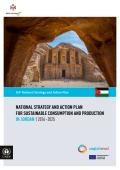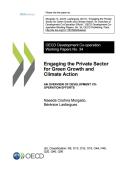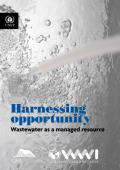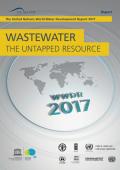
This resource is also available in Arabic.
The National Strategy and Action Plan for Mainstreaming Sustainable Consumption and Production into Agriculture/Food Production, Transport, and Waste Management Sectors in the Hashemite Kingdom of Jordan (2016-2025) aims at supporting the implementation of agreed on SCP strategic, operational objectives and actions at the national level. This document has been prepared in line with the regional SCP Action Plan for the Mediterranean, in cooperation with the SWITCH-Med Programme and financed by the European Union to support SCP common objectives in the region. Jordan’s SCP Strategy and National Action Plan (NAP) addresses key human activities, which have a particular impact on the Jordanian environment including marine and coastal areas and related transversal and crosscutting issues. It defines common objectives and identifies actions guiding the implementation of the SCP at the national level.

Developing Sustainable Consumption and Production (SCP) National Action Plans (NAP) contributes to poverty alleviation, environmental sustainability and the development of a green economy. SCP-NAPs are the first step in a country’s response to 2015 adopted Sustainable Development Goals (SDGs) and in particular Goal 12: Ensure Sustainable Consumption and Production patterns.
Between January and November 2015, in a multi-stakeholder and inclusive process, Lebanon developed a national SCP Action Plan for the Industrial Sector to promote Sustainable Consumption and Production patterns, with a special focus on the Litani Basin and Qaraoun Lake. The SCP Action Plan for the Industrial Sector in Lebanon has identified 3 operational objectives: Adopt Best Available Techniques to promote SCP in the industrial sector; Introduce SCP approaches related to the industrial sector in the policy and institutional frameworks; Educate and raise awareness of consumers on SCP in the industrial sector.

The private sector plays an important role in enabling or hindering green growth in developing countries. With increasing emphasis for development co-operation providers to engage private actors, there is a need for a sound understanding of the theory of change and the efficacy of private sector engagement approaches in supporting environment and development outcomes.
This paper contributes to this agenda and helps inform efforts of development assistance provider. It maps the major approaches used to engage the private sector, i.e. to mobilise private climate investment, promote green private sector development and harness the skills and knowledge from private actors, and highlights some challenges and lessons learned. The paper also provides an estimate of climate-related development finance targeting private sector engagement.

Wastewater is a valuable resource that we need to harness. That is the key message in a new publication from UN Environment, the Global Programme of Action and the Global Wastewater Initiative.
The issue of what to do with wastewater, that is water that has been adversely affected by human activities such as farming, industrial production and domestic use, has long challenged development experts, companies, environmentalists, policymakers and urban planners alike. And although improvements have been made, it is still true that globally, about 80 per cent of wastewater is being discharged untreated. This has negative consequences for nature and humans alike. Untreated wastewater degrades the marine environment, and can contribute to the creation of so-called dead zones. Areas of the ocean that are so depleted of oxygen that they are void of marine life. At the same time, poor wastewater management and improper sanitation represent a significant factor in the spread of infectious disease.

Most human activities that use water produce wastewater. As the overall demand for water grows, the quantity of wastewater produced and its overall pollution load are continuously increasing worldwide. Over 80% of the world’s wastewater – and over 95% in some least developed countries – is released to the environment without treatment. Once discharged into water bodies, wastewater is either diluted, transported downstream or infiltrates into aquifers, where it can affect the quality (and therefore the availability) of freshwater supplies. The ultimate destination of wastewater discharged into rivers and lakes is often the ocean with negative consequences for the marine environment.
